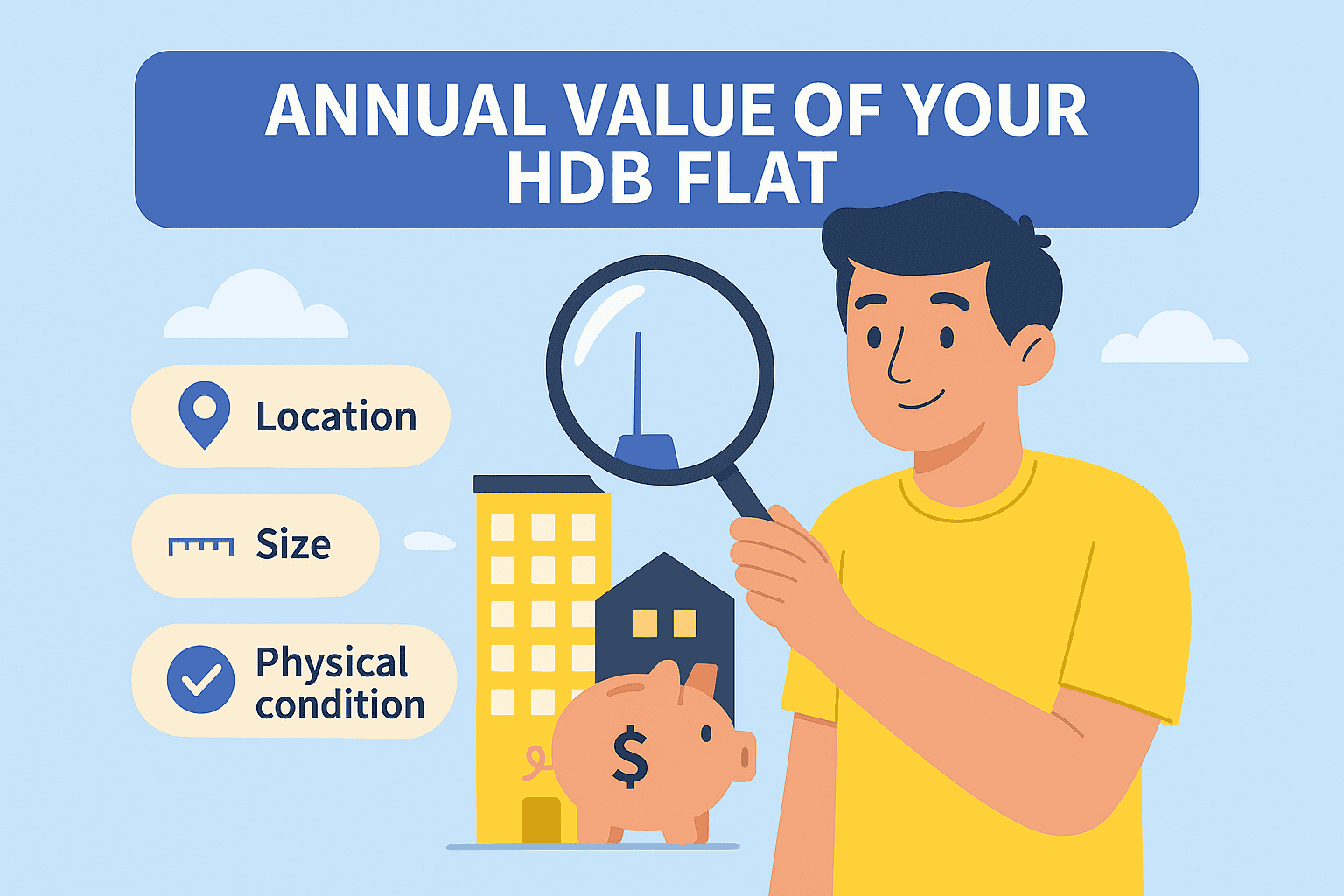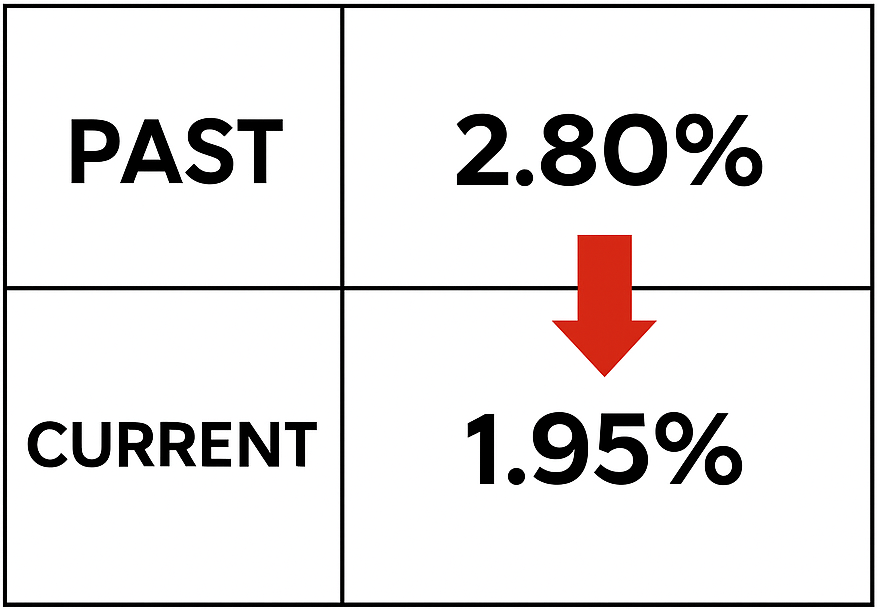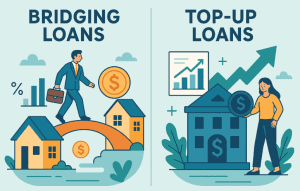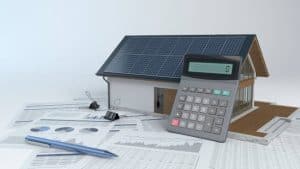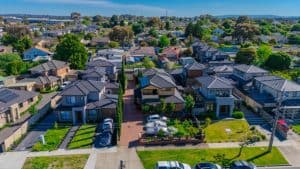Wondering what the Annual Value of your property means for your finances in 2025? You’re not alone. In Singapore, AV isn’t just another jargon—it plays a big role in your property tax and even your eligibility for certain government perks.
In this guide, we’ll break down what Annual Value is, how it’s calculated, and why it matters—all in a clear, casual way. Whether you’re a homeowner or investor, understanding AV helps you plan better and avoid surprises.
If you’re ready to take charge of your property finances, let’s dive in!
What Is the Annual Value of Property? (AV) — A Simple Explanation
If you’re new to the Singapore property market, the term Annual Value (AV) might sound complicated—but don’t worry. It’s simply an estimate of how much rent your property could earn in a year, and it’s something every homeowner or investor should understand.
Annual Value Definition and Why It’s Important
Thinking of buying a home or investing in property? Then you need to know about Annual Value (AV).
- AV is the estimated yearly rental income your property could earn (excluding furniture and maintenance).
- It’s determined by IRAS—based on rentals of similar properties in your area, not necessarily what you charge or collect.
- And yes, even if you live in the property yourself, AV still matters!
Why should you care?
AV directly affects your property tax and whether you qualify for government benefits like GST Vouchers or the Assurance Package. A lower AV can mean tax savings and more eligibility for rebates.
My tip is to always check your latest AV on IRAS’ website. If it seems too high, you might want to file an objection—more on that later.
How Annual Value Impacts Property Tax and Government Schemes
Here’s where it gets real:
- AV is the foundation of your property tax calculation. The higher the AV, the higher the tax.
- For owner-occupied homes, Singapore uses a tiered tax rate that keeps taxes lower for most homeowners—up to a point.
- If your AV crosses certain thresholds, you may lose access to government perks like GST Vouchers or the Assurance Package.
My advice is to keep track of rental market trends—AV can change annually. If the market heats up, your AV might rise, too.
Myths and Misconceptions About AV
Despite its importance, there are plenty of misconceptions surrounding AV in Singapore. Let’s clear the air and separate fact from fiction so you can make informed decisions about your property tax and eligibility for government schemes.
Common Myths About Annual Value of Property in Singapore and the Real Truth (2025)
| BANK | LOAN TYPE | Expert Tip |
|---|---|---|
| AV equals your actual rent | AV is an estimate determined by IRAS based on comparable rentals—not what you actually charge or collect. | Even if you live in the property, AV matters for your tax bill and rebates. |
| AV never changes | AV can be updated every year, depending on the rental market. | Check your AV annually on IRAS website. |
| AV only matters if you rent out your home | AV applies to all residential properties—even if they’re owner-occupied. | Plan ahead: higher AV can mean higher property taxes. |
How Is Annual Value Calculated by IRAS?
Curious about how IRAS determines the Annual Value (AV) of your property? You’re not alone. Understanding this process can help you manage your property taxes—and even plan your budget smarter.
Key Factors IRAS Considers (Rental Comparables, Location, Property Type)
IRAS uses a market-based approach to determine your property’s AV. Here’s what they look at:
- Comparable Rentals: What similar properties in your area are renting for.
- Location: Prime districts often have higher AVs.
- Property Type: HDB flat, condo, or landed property.
- Condition and Amenities: Newer units or those with better facilities might get a higher AV.
It is important to always keep an eye on market trends. Even if you’re not renting out your property, AV changes can affect your property tax—and even eligibility for certain government rebates.
Want to understand how AV fits into your home loan plans? Check out our Singapore home loan rates to budget effectively and avoid surprises.
How Often Is AV Reviewed and Updated?
AV isn’t set in stone. IRAS reviews AV annually, adjusting for shifts in the rental market. This means:
- If rental rates in your area increase, your AV might go up too.
- Even if your property is owner-occupied, you could still see annual adjustments.
Mark your calendar for AV updates! Check your latest AV every year on IRAS’ myTax Portal.
How Renovations and Upgrades Can Affect AV
Thinking about a major renovation? That new kitchen or balcony extension might boost your property’s value—and potentially its AV.
- Major Upgrades: IRAS can reassess your AV if your property’s features or size change significantly.
- Market Comparisons: Your upgraded home might be compared to other newer or renovated properties, which could raise your AV.
- Timing Matters: Any reassessment usually happens after IRAS becomes aware of the changes (like during annual reviews).
Before starting renovations, factor in possible AV increases and their impact on your property tax. Want to keep your home financing in check? Explore the best rates with our home loan calculator to make smart decisions.
How to Check and Estimate Your Property’s Annual Value
Once you understand how AV is calculated, the next step is finding out what yours is. Don’t worry—it’s easier than you think. Here’s how to check and estimate your property’s Annual Value so you can stay on top of your finances.
Using the IRAS myTax Portal to View AV
The most reliable way to check your property’s AV is through the IRAS myTax Portal. Here’s how:
- Log in with your SingPass.
- Navigate to Property > View Annual Value.
- Enter your property details and get instant access to your current AV.
I always make it a habit to check my AV annually—especially after major market shifts or renovations.
Want to know how AV affects your home loan payments? Visit our home loan calculator to see how different AVs might impact your overall budget.
Third-Party Tools for AV Estimation (99.co, SRX)
If you’re curious about your AV before official figures are out—or you’re researching a property to buy—third-party tools can give you a quick estimate:
- 99.co’s Property Value Tool: Offers approximate estimates based on recent transactions and rental data in your area.
- SRX X-Value: Provides insights using transaction trends and comparable rentals, helping you gauge your property’s rental potential.
These tools are great for getting a sense of your property’s estimated AV—especially if you’re budgeting for property tax or planning a purchase.
However, they’re just a starting point: always cross-check with the official AV from IRAS to get the final figure that affects your tax bill and eligibility for government schemes.
Try to combine these early estimates with Ace Mortgage’s expert insights on property loan rates in Singapore to plan your home budget effectively and avoid surprises.
How to View Other Properties’ AV (Fees and Process)
Want to compare AVs of similar properties? IRAS lets you check AVs for other residential units—but for a small fee:
- Go to IRAS’ AV page.
- Use the “Check Annual Value of Other Properties” tool.
- Pay a nominal fee per property to see its AV.
This is especially helpful if you’re planning to buy, sell, or even file an objection for your own property.
Knowing your neighbors’ AV can help you gauge if yours is fair—and whether you should challenge it.Planning to buy or refinance your property? Use our compare mortgage rates Singapore tool to find the best fit for your financial goals.
Property Tax Rates and Rebates Based on Annual Value (2025)
Understanding how property tax rates work is crucial if you want to plan your budget effectively. With the 2025 changes now in place, it’s even more important to know how your Annual Value (AV) influences the property tax you pay—and what rebates and reliefs might apply.
Owner-Occupied Property Tax Rates
If you’re living in your own home, good news: Singapore’s tax system uses progressive property tax rates for owner-occupied properties. This means lower AV properties enjoy lower tax rates.
Owner-Occupied Property Tax Rates Singapore 2025
| AV Band (SGD) | Tax Rate |
|---|---|
| First $8,000 | 0% |
| Next $47,000 | 4% |
| Next $15,000 | 6% |
| Next $15,000 | 8% |
| Next $15,000 | 10% |
| Next $15,000 | 12% |
| Next $15,000 | 14% |
| Above $120,000 | 16% |
Knowing your AV can help you estimate your annual property tax bill. Check your AV on the IRAS myTax Portal regularly to stay updated.
Planning to buy your first home? Compare the best home loan rates in Singapore to find a package that fits your budget.
Non-Owner-Occupied Property Tax Rates
If you own a property you rent out—or one that’s vacant—be aware: non-owner-occupied properties are taxed at higher rates.
Non-Owner-Occupied Property Tax Rates Singapore 2025
| AV Band (SGD) | Tax Rate |
|---|---|
| First $30,000 | 12% |
| Next $15,000 | 20% |
| Next $15,000 | 28% |
| Next $15,000 | 36% |
| Above $75,000 | 44% |
Having higher AVs mean higher tax bills. Make sure to factor this into your investment planning—especially if you’re considering buying a second property.
Thinking of refinancing your investment property? Use our mortgage refinancing rates guide to get the best deal.
2025 Budget: New Tax Rebates and Reliefs
Good news for homeowners! The 2025 Budget introduced one-off property tax rebates to help offset higher property tax bills.
- Most owner-occupied HDB flats and about 90% of private homes will see lower tax bills this year thanks to the rebates.
- These rebates aim to ease the financial load for households amid rising costs.
Stay informed by checking the latest announcements on the Ministry of Finance website.
Try pairing these rebates with smart mortgage planning—use our home loan refinancing calculator to see if refinancing your mortgage could save you even more.
How to Dispute or Appeal Your Property’s Annual Value
Think your property’s Annual Value (AV) is too high? Don’t worry—IRAS allows homeowners to file an objection or appeal. This section explains when you can object, how to submit it, and what to expect after filing.
When You Can File an Objection

You can file an objection to your property’s AV if you believe it doesn’t reflect your home’s fair rental value. Here are some valid reasons:
- A significant drop in rental values in your neighborhood.
- Major repairs or damage that reduces the rental potential.
- If comparable properties in the area have a lower AV.
You can’t object to AV simply because you want to pay less tax—IRAS only accepts objections supported by solid evidence.
Need help planning your property budget after filing an objection? Our home loan rates Singapore page can help you strategize your monthly payments.
How to Submit an Objection via myTax Portal
Submitting an objection is straightforward. Here’s how:
- Log in to the IRAS myTax Portal.
- Navigate to Property Tax > Objection to Annual Value.
- Provide supporting documents (e.g. recent rental transactions, photos, or valuation reports).
- Submit your request within 30 days from the date of the valuation notice.
It is important to always keep a copy of your submission for your records, and consider consulting a property professional if your case is complex.
Want to explore better home loan options while you wait for your appeal outcome? Check out our mortgage broker Singapore page for expert advice.
What Happens After Filing an Objection

Once you submit your objection:
- IRAS will review your case and may request additional information.
- You’ll receive a written reply (usually within 30 working days).
- If IRAS agrees, they’ll adjust your AV and property tax bill.
- If IRAS disagrees, you can further appeal to the Valuation Review Board (VRB).
The VRB is an independent panel that reviews AV disputes. Be prepared to present evidence and attend a hearing if needed.
If you’re considering refinancing after a successful AV adjustment, use our home loan refinancing guide to maximize your savings.
Government Schemes and Benefits Tied to Annual Value
Did you know your property’s Annual Value (AV) doesn’t just affect your property tax? It also plays a key role in determining your eligibility for various government support schemes. Let’s dive into what’s at stake—and how to make the most of it.
Eligibility for GST Vouchers, Assurance Package, and More
Your AV can determine whether you qualify for support like:
- GST Vouchers: Provides annual cash payouts and MediSave top-ups to help offset GST expenses.
- Assurance Package: A temporary financial aid to cushion cost-of-living increases.
- Other government benefits tied to your AV bracket.
As of 2025, homes with an AV below S$25,000 are typically eligible for these schemes—meaning that even a small change in AV could affect your benefits.
Remember to check your AV on IRAS’ myTax Portal annually, especially if you’re budgeting for financial support.
Need to plan your home finances alongside these schemes? Visit our Singapore home loan rates page for the best rates.
AV’s Impact on CPF, MediShield, and Other Subsidies
AV also plays a part in other government assistance programs:
- CPF Housing Grants: Your AV can influence grant eligibility, especially for resale flats.
- MediShield Life Premiums: Subsidies may be affected by your AV bracket.
- Other Financial Assistance: Programs like the Cost-of-Living Special Payment use AV as part of the means testing.
A higher AV doesn’t always mean higher property value—sometimes it’s just the rental market moving. Always double-check with official IRAS figures to avoid surprises.
Want to see how your AV might affect your monthly payments? Check out our mortgage loan rate calculator to budget confidently.
Changes to AV Thresholds in Budget 2025
The 2025 Budget introduced new thresholds for support schemes to keep pace with rising home values. Key highlights:
- More households can now qualify for rebates and benefits thanks to higher AV limits.
- These changes aim to cushion the impact of higher property values on everyday Singaporeans.
Stay up-to-date by checking the latest announcements on the Ministry of Finance website.
Don’t miss out on potential savings—pair these benefits with a smart financing plan using our best home loan rates in Singapore guide.
Frequently Asked Questions About Annual Value
Got questions about Annual Value (AV) and how it affects your property and finances? You’re not alone. Here are some of the most common queries homeowners and investors ask about AV in Singapore.
Is Annual Value the Same as Market Value?
Nope, they’re not the same!
- Annual Value (AV): Estimated gross annual rent of your property, determined by IRAS based on comparable rentals.
- Market Value: The price your property would fetch if sold in the open market.
AV is used for calculating property tax and eligibility for government benefits—it doesn’t directly affect your sale price. Always refer to your property’s valuation report or speak to a qualified property agent to understand its market value.
Curious about how AV might influence your home loan application? Compare the latest home loan interest rates Singapore to plan your finances wisely.
Can I Lower My Property Tax by Reducing AV?
In theory, yes—but it’s not as simple as just asking for a lower figure. You can file an objection to your AV with IRAS if:
- You believe your property’s AV is higher than comparable rentals.
- There’s been significant damage or changes affecting rental potential.
- There’s a big drop in local rental rates.
However, simply wanting to pay less tax isn’t enough—you’ll need supporting evidence like rental listings or recent transaction data.
It is important to keep an eye on market trends. If comparable rents in your area fall, your AV might naturally decrease at the next IRAS review.
Need help navigating this? Our mortgage advisory Singapore experts can help you understand how AV changes might impact your financial planning.
How Does AV Affect Rental and Sale Decisions?
AV can indirectly influence your decisions when renting or selling your property. Here’s how:
- Rental Decisions: If your AV is significantly higher than actual rents, you might appeal to IRAS for a lower AV to reduce your tax burden.
- Sale Decisions: While AV doesn’t directly set your selling price, buyers may consider your property’s AV when estimating holding costs or comparing it to similar units.
- Investment Planning: Properties with a lower AV could be more attractive to buyers seeking lower property tax liabilities.
Before buying or selling, use our mortgage calculator Singapore to understand your financial obligations and plan effectively.

